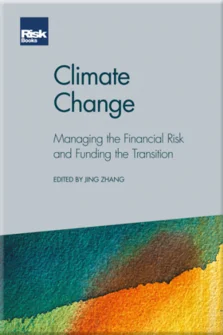Catastrophe risk modelling and climate change
Robert Muir-Wood and Joss Matthewman
Foreword
Introduction
Sustainability for critical ecosystems: The future of risk management – more of the same or a new paradigm?
Climate change is a source of financial risk
The climate disclosure landscape in the finance sector
Green boxes? An overview of climate risk tools and analytics
Embedding climate change in financial metrics
Modelling climate physical risks
Climate-related stress-testing: Transition risks
Catastrophe risk modelling and climate change
Evidence-based climate stress testing
Climate risk drives a new paradigm in risk management
Incorporating climate change in asset allocation and portfolio construction
(Car)bon voyage: The road to low-carbon investment portfolios
Climate risk primer for community banks: Concepts and policies during a period of significant change
Next-generation analytics for climate finance
Climate finance post-COP26
Mobilising private funding
Climate change is the response of the Earth’s climate system to rising atmospheric greenhouse gas levels, which is accepted to be primarily driven by human activity. This response includes an overall increase in large-scale or macro-climatic variables such as global mean surface temperature and global mean sea level, but there is also a growing weight of scientific evidence demonstrating linkages to changes in the behaviour of rare and extreme weather events, such as North Atlantic hurricanes or windstorms in Europe. The base of scientific data generated by bodies such as the Intergovernmental Panel on Climate Change (IPCC) is immense, and the scope of research is expanding rapidly as new climate change insights are revealed and greater scientific consensus is attained.
Businesses find themselves on the climate change frontline and must now understand how a changing climate will affect their operations, assets and liabilities. This involves understanding the physical impacts of climate change as we move through the next 10, 30 or even 50 years. What will be the impact of rising temperatures across the global climate system, where are we heading in terms of potential
Copyright Infopro Digital Limited. All rights reserved.
As outlined in our terms and conditions, https://www.infopro-digital.com/terms-and-conditions/subscriptions/ (point 2.4), printing is limited to a single copy.
If you would like to purchase additional rights please email info@risk.net
Copyright Infopro Digital Limited. All rights reserved.
You may share this content using our article tools. As outlined in our terms and conditions, https://www.infopro-digital.com/terms-and-conditions/subscriptions/ (clause 2.4), an Authorised User may only make one copy of the materials for their own personal use. You must also comply with the restrictions in clause 2.5.
If you would like to purchase additional rights please email info@risk.net











